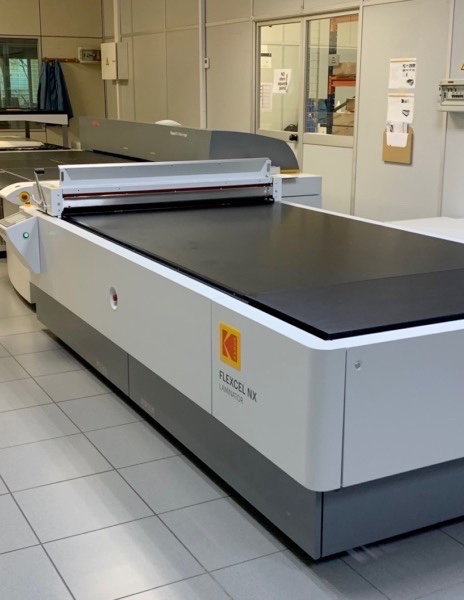Prepress
Chemence Graphics Spain conquers corrugated cardboard sector with KODAK FLEXCEL NX

Tuesday 07. September 2021 - With more than 35 years experience in the packaging printing industry, Chemence Graphics, a leader in flexo prepress solutions, pioneered the use of a KODAK FLEXCEL NX Wide 4260 CTP System in the Spanish market several years ago.
The company has now decided to enlarge the format of the laminator and installed a KODAK FLEXCEL NX Wide 5080 System, also from Miraclon, at its facility in Amposta, Spain. The new device allows the company to “manufacture top quality, large-size plates for the corrugated cardboard printing market to eliminate the need for splicing, reduce waste and optimize production,” explains Jorge Rubio, Manager of Chemence Graphics.
“The larger plates give us flexibility when switching from one order to another, increasing our agility and reducing waste, thanks to the maximum plate format of 1,270 x 2,032 mm. We use the KODAK FLEXCEL NXC plate, which delivers better ink coverage in spot color printing and a good transition in gradients. This minimizes the effect of material waves for the corrugated cardboard printer, which means working with less pressure between the plate and the substrate,” says Rubio.
It was clear for Chemences Manager that Miraclon would be the go-to supplier for this equipment upgrade. “Chemence Graphics Spain has a large fleet of machinery to produce all types of plates, and we wanted to continue to offer a service of the highest caliber. While it is true that in recent years the sector in general has made great strides forward in quality, both in plates and in machinery and software, FLEXCEL NX Technology from Miraclon is still a step ahead.”
More production capacity
According to Rubio, with the installation of the FLEXCEL NX Wide 5080 System, Chemence has not only improved quality and format flexibility, but also increased its production capacity by around 40%, an investment that has clearly paid off. “We have been working with the FLEXCEL NX System for many years and have no doubts whatsoever about its quality and results. We are totally satisfied, as are our customers who use this solution. And although it is still too early for them to assess the full impact of the new equipment as it has only just been installed, we are convinced that the quality offered by the FLEXCEL NX System, together with our experience in NX technology, puts us at the forefront of delivering some of the highest quality print in Spain.”
The fine image reproduction, print contrast and high print densities achieved with the FLEXCEL NX System allows Chemence to compete for contracts that were traditionally outside the capabilities of flexographic printing, so brands can take advantage of the flexibility and cost effectiveness of flexographic applications without compromising on the quality they would normally expect from offset, gravure or digital printing. In addition, FLEXCEL NX plates deliver print efficiencies such as shorter make-ready times, reduced waste and a longer plate life.
DIGICAP NX Patterning and KODAK SQUARESPOT Imaging Technology from Miraclon
The texturization of the plate surface using DIGICAP NX Patterning, which is part of the FLEXCEL NX System, guarantees higher densities, a wider color gamut and improvements in the utilization of combination plates, making it possible to reduce the number of plates required for each job. As Rubio puts it, “the possibility of using DIGICAP NX Patterning has enabled us to improve ink transfer on different substrates and achieve higher densities, and to widen the color gamut. It has also allowed us to create designs with fewer colors, in some cases completing orders with a smaller number of inks.”
Chemence Graphics Spain also uses KODAK SQUARESPOT Imaging technology to provide exceptional quality, productivity and uniformity that Jorge Rubio believes is indisputable. “This technology gives us the possibility to work with a very high recording resolution that sees us consistently recording minimum percentages below 1%, thus achieving a great result in high-light designs. It also allows us to keep our process more stable, and commercially these features pave the way for improvements in the different markets we serve.”
“Miraclon has been a key supplier to Chemence Graphics Spain for many years. We cooperate on several projects to ensure we offer a differentiated solution and they support us in our goal to offer the highest quality and the best service. On the theme of quality, we are testing alternative screens with which we are obtaining extraordinary results. In terms of service level, the new production plant and a revamped team in Madrid bring us closer to our customers in central Spain and allow us to meet the most demanding service standards. Currently, we serve our customers directly both in Catalonia and Levante, and now also in Madrid,” concludes Chemence Graphics Manager Jorge Rubio.
Chemence Graphics was established through the acquisition of several well-known prepress companies in the European flexography industry. All these companies had a wealth of knowledge and experience built up over many years, supplying tailor-made solutions for the changing packaging printing industry and with a strong commitment to environmental and quality standards. Chemence Graphics currently has four sites in Europe (three in Spain and one in France), and a total of 150 employees enabling it to offer its customers a global and optimized management of their packaging requirements.
“Our work is mainly the manufacture of all types of flexo plates, with particular emphasis on high-quality flexible packaging printing and focusing on the added value offered by our expert prepress team. In addition, Chemence Graphics Spain is one of the few suppliers that also boasts a corrugated cardboard printing division,” says Jorge Rubio.
“Since expanding into Spain at the end of 2014, we have been committed to continuous and progressive improvement, and the market is recognizing our good work. We have become a total supplier, in that we offer the widest range of plates and local production,” concludes Rubio.
